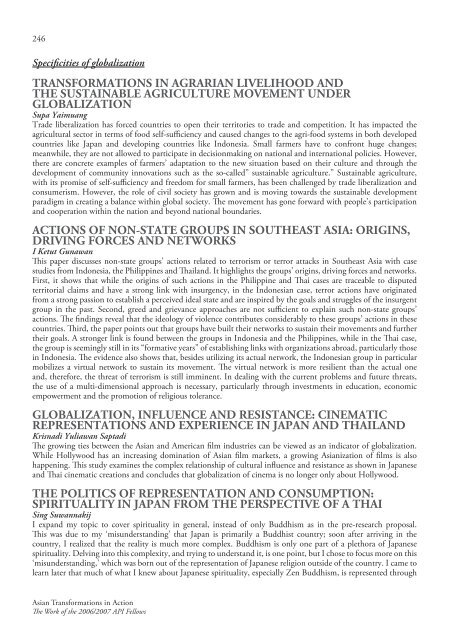Asian Transformations in Action - Api-fellowships.org
Asian Transformations in Action - Api-fellowships.org
Asian Transformations in Action - Api-fellowships.org
You also want an ePaper? Increase the reach of your titles
YUMPU automatically turns print PDFs into web optimized ePapers that Google loves.
246Specificities of globalizationTRANSFORMATIONS IN AGRARIAN LIVELIHOOD ANDTHE SUSTAINABLE AGRICULTURE MOVEMENT UNDERGLOBALIZATIONSupa YaimuangTrade liberalization has forced countries to open their territories to trade and competition. It has impacted theagricultural sector <strong>in</strong> terms of food self-sufficiency and caused changes to the agri-food systems <strong>in</strong> both developedcountries like Japan and develop<strong>in</strong>g countries like Indonesia. Small farmers have to confront huge changes;meanwhile, they are not allowed to participate <strong>in</strong> decisionmak<strong>in</strong>g on national and <strong>in</strong>ternational policies. However,there are concrete examples of farmers’ adaptation to the new situation based on their culture and through thedevelopment of community <strong>in</strong>novations such as the so-called” susta<strong>in</strong>able agriculture.” Susta<strong>in</strong>able agriculture,with its promise of self-sufficiency and freedom for small farmers, has been challenged by trade liberalization andconsumerism. However, the role of civil society has grown and is mov<strong>in</strong>g towards the susta<strong>in</strong>able developmentparadigm <strong>in</strong> creat<strong>in</strong>g a balance with<strong>in</strong> global society. The movement has gone forward with people’s participationand cooperation with<strong>in</strong> the nation and beyond national boundaries.ACTIONS OF NON-STATE GROUPS IN SOUTHEAST ASIA: ORIGINS,DRIVING FORCES AND NETWORKSI Ketut GunawanThis paper discusses non-state groups’ actions related to terrorism or terror attacks <strong>in</strong> Southeast Asia with casestudies from Indonesia, the Philipp<strong>in</strong>es and Thailand. It highlights the groups’ orig<strong>in</strong>s, driv<strong>in</strong>g forces and networks.First, it shows that while the orig<strong>in</strong>s of such actions <strong>in</strong> the Philipp<strong>in</strong>e and Thai cases are traceable to disputedterritorial claims and have a strong l<strong>in</strong>k with <strong>in</strong>surgency, <strong>in</strong> the Indonesian case, terror actions have orig<strong>in</strong>atedfrom a strong passion to establish a perceived ideal state and are <strong>in</strong>spired by the goals and struggles of the <strong>in</strong>surgentgroup <strong>in</strong> the past. Second, greed and grievance approaches are not sufficient to expla<strong>in</strong> such non-state groups’actions. The f<strong>in</strong>d<strong>in</strong>gs reveal that the ideology of violence contributes considerably to these groups’ actions <strong>in</strong> thesecountries. Third, the paper po<strong>in</strong>ts out that groups have built their networks to susta<strong>in</strong> their movements and furthertheir goals. A stronger l<strong>in</strong>k is found between the groups <strong>in</strong> Indonesia and the Philipp<strong>in</strong>es, while <strong>in</strong> the Thai case,the group is seem<strong>in</strong>gly still <strong>in</strong> its “formative years” of establish<strong>in</strong>g l<strong>in</strong>ks with <strong>org</strong>anizations abroad, particularly those<strong>in</strong> Indonesia. The evidence also shows that, besides utiliz<strong>in</strong>g its actual network, the Indonesian group <strong>in</strong> particularmobilizes a virtual network to susta<strong>in</strong> its movement. The virtual network is more resilient than the actual oneand, therefore, the threat of terrorism is still imm<strong>in</strong>ent. In deal<strong>in</strong>g with the current problems and future threats,the use of a multi-dimensional approach is necessary, particularly through <strong>in</strong>vestments <strong>in</strong> education, economicempowerment and the promotion of religious tolerance.GLOBALIZATION, INFLUENCE AND RESISTANCE: CINEMATICREPRESENTATIONS AND EXPERIENCE IN JAPAN AND THAILANDKrisnadi Yuliawan SaptadiThe grow<strong>in</strong>g ties between the <strong>Asian</strong> and American film <strong>in</strong>dustries can be viewed as an <strong>in</strong>dicator of globalization.While Hollywood has an <strong>in</strong>creas<strong>in</strong>g dom<strong>in</strong>ation of <strong>Asian</strong> film markets, a grow<strong>in</strong>g <strong>Asian</strong>ization of films is alsohappen<strong>in</strong>g. This study exam<strong>in</strong>es the complex relationship of cultural <strong>in</strong>fluence and resistance as shown <strong>in</strong> Japaneseand Thai c<strong>in</strong>ematic creations and concludes that globalization of c<strong>in</strong>ema is no longer only about Hollywood.THE POLITICS OF REPRESENTATION AND CONSUMPTION:SPIRITUALITY IN JAPAN FROM THE PERSPECTIVE OF A THAIS<strong>in</strong>g SuwannakijI expand my topic to cover spirituality <strong>in</strong> general, <strong>in</strong>stead of only Buddhism as <strong>in</strong> the pre-research proposal.This was due to my ‘misunderstand<strong>in</strong>g’ that Japan is primarily a Buddhist country; soon after arriv<strong>in</strong>g <strong>in</strong> thecountry, I realized that the reality is much more complex. Buddhism is only one part of a plethora of Japanesespirituality. Delv<strong>in</strong>g <strong>in</strong>to this complexity, and try<strong>in</strong>g to understand it, is one po<strong>in</strong>t, but I chose to focus more on this‘misunderstand<strong>in</strong>g,’ which was born out of the representation of Japanese religion outside of the country. I came tolearn later that much of what I knew about Japanese spirituality, especially Zen Buddhism, is represented through<strong>Asian</strong> <strong>Transformations</strong> <strong>in</strong> <strong>Action</strong>The Work of the 2006/2007 API Fellows
















